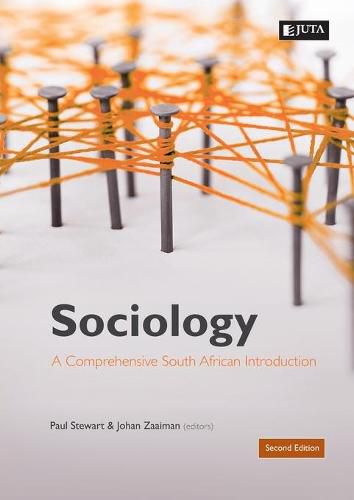Readings Newsletter
Become a Readings Member to make your shopping experience even easier.
Sign in or sign up for free!
You’re not far away from qualifying for FREE standard shipping within Australia
You’ve qualified for FREE standard shipping within Australia
The cart is loading…






Is South Africa more equitable now than in 1994? How can domestic violence be explained? How are we as individuals shaped by large structures, forces and institutions? Why is the environment important for society?
Sociology: A Comprehensive South African Introduction provides a comprehensive introduction to the sociological theories and themes commonly taught in undergraduate courses.
The book is divided into five broad sections: the foundations of sociology; the individual in society; the institutions in society; the challenges for society; and sociology in context.
Each chapter addresses key issues, topics and debates in sociology today, and uses contemporary and current South African case studies
to make the material relevant and meaningful to students. Chapter introductions serve as a narrative linking and providing crossreferences to material covered in other chapters, where appropriate.
CONTENTS
Introduction
Part 1: The foundations of
sociology
Sociological theory
Research methodology
Population
Social change
Part 2: The individual in society
Culture
Socialisation and identity
Sexuality
Race
The institutions in society
Part 3: The institutions in
society
Organisations, movements and bureaucracy
Family and households
Education
Religion
Work
The economy
Politics and governance
Mass and social media
Medicine and health
Sport
Part 4: Challenges for society
Class
Social inequality
Poverty
Crime and deviance
Urbanisation
Rurality
Environments
Power and social movements
Part 5: Sociology in context
KEY FEATURES
Written with the student in mind, the language used is accessible and easy to understand and the carefully developed pedagogical features in each chapter serve to support students’ learning.
Additional references at the end of each chapter in the textbook include journal articles, books and websites.
The glossary is also available online and accessible to all students using the book.
Support material for prescribing lecturers includes multiple choice questions, sample short paragraph questions and essays with memoranda.
$9.00 standard shipping within Australia
FREE standard shipping within Australia for orders over $100.00
Express & International shipping calculated at checkout
Is South Africa more equitable now than in 1994? How can domestic violence be explained? How are we as individuals shaped by large structures, forces and institutions? Why is the environment important for society?
Sociology: A Comprehensive South African Introduction provides a comprehensive introduction to the sociological theories and themes commonly taught in undergraduate courses.
The book is divided into five broad sections: the foundations of sociology; the individual in society; the institutions in society; the challenges for society; and sociology in context.
Each chapter addresses key issues, topics and debates in sociology today, and uses contemporary and current South African case studies
to make the material relevant and meaningful to students. Chapter introductions serve as a narrative linking and providing crossreferences to material covered in other chapters, where appropriate.
CONTENTS
Introduction
Part 1: The foundations of
sociology
Sociological theory
Research methodology
Population
Social change
Part 2: The individual in society
Culture
Socialisation and identity
Sexuality
Race
The institutions in society
Part 3: The institutions in
society
Organisations, movements and bureaucracy
Family and households
Education
Religion
Work
The economy
Politics and governance
Mass and social media
Medicine and health
Sport
Part 4: Challenges for society
Class
Social inequality
Poverty
Crime and deviance
Urbanisation
Rurality
Environments
Power and social movements
Part 5: Sociology in context
KEY FEATURES
Written with the student in mind, the language used is accessible and easy to understand and the carefully developed pedagogical features in each chapter serve to support students’ learning.
Additional references at the end of each chapter in the textbook include journal articles, books and websites.
The glossary is also available online and accessible to all students using the book.
Support material for prescribing lecturers includes multiple choice questions, sample short paragraph questions and essays with memoranda.